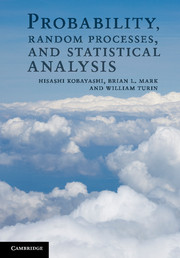 Probability, Random Processes, and Statistical Analysis
Probability, Random Processes, and Statistical Analysis Book contents
- Frontmatter
- Contents
- List of abbreviations and acronyms
- Preface
- Acknowledgments
- 1 Introduction
- Part I Probability, random variables, and statistics
- Part II Transform methods, bounds, and limits
- Part III Random processes
- Part IV Statistical inference
- Part V Applications and advanced topics
- 20 Hidden Markov models and applications
- 21 Probabilistic models in machine learning
- 22 Filtering and prediction of random processes
- 23 Queueing and loss models
- References
- Index
21 - Probabilistic models in machine learning
from Part V - Applications and advanced topics
Published online by Cambridge University Press: 05 June 2012
- Frontmatter
- Contents
- List of abbreviations and acronyms
- Preface
- Acknowledgments
- 1 Introduction
- Part I Probability, random variables, and statistics
- Part II Transform methods, bounds, and limits
- Part III Random processes
- Part IV Statistical inference
- Part V Applications and advanced topics
- 20 Hidden Markov models and applications
- 21 Probabilistic models in machine learning
- 22 Filtering and prediction of random processes
- 23 Queueing and loss models
- References
- Index
Summary
Introduction
Machine learning refers to the design of computer algorithms for gaining new knowledge, improving existing knowledge, and making predictions or decisions based on empirical data. Applications of machine learning include speech recognition [164, 275], image recognition [60, 110], medical diagnosis [309], language understanding [50], biological sequence analysis [85], and many other fields. The most important requirement for an algorithm in machine learning is its ability to make accurate predictions or correct decisions when presented with instances or data not seen before.
Classification of data is a common task in machine learning. It consists of finding a function z = G(y) that assigns to each data sample y its class label z. If the range of the function is discrete, it is called a classifier, otherwise it is called a regression function. For each class label z, we can define the acceptance region Az such that y ∈ Az if and only if z = G(y). An error occurs if the classifier assigns a wrong class to y. The probability of classification error
is called the generalization error in machine learning, where Z denotes the actual class to which the observation variable Y belongs. The classifier that minimizes the generalization error is called the Bayes classifier and the minimized ε(G) is called the Bayes error. In practical applications, we generally do not know the probability distribution of (Y, Z).
Information
- Type
- Chapter
- Information
- Probability, Random Processes, and Statistical AnalysisApplications to Communications, Signal Processing, Queueing Theory and Mathematical Finance, pp. 615 - 644Publisher: Cambridge University PressPrint publication year: 2011